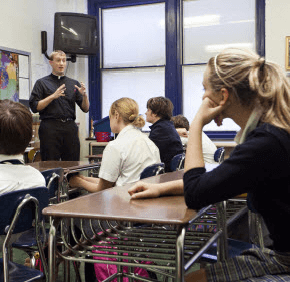By Maria Wiering
Twitter: @ReviewWiering
HAGERSTOWN – As a seminarian, Paul Kuhn is used to being a student, but he is getting a real taste of teaching.
Kuhn, 25, stood behind a podium in a classroom in December at St. Maria Goretti High School and tried to engage students with questions about Our Lady of Guadalupe.
“Who is she?” he asked, echoing the question on his PowerPoint presentation.
At first, the ninth-graders were silent, but Kuhn was persistent. Soon, the 11 students were spouting facts ranging from the symbolism found in the 16th-century image to its supposed miraculous qualities.
Kuhn grinned. He was off to a good start.
It was his first time teaching a full period at the high school, although he had spent time meeting with administrators and staff and observing classes, part of a formation requirement at Mount St. Mary’s Seminary in Emmitsburg, where he is studying to become a priest.
Called “pastoral field education,” the program places first-year theology students in Catholic schools or parish religious education programs in Maryland, Pennsylvania; Virginia; and Washington, D.C. Participating Archdiocese of Baltimore schools include Goretti; Mother Seton School, Emmitsburg; St. John Regional Catholic School, Frederick; St. John School, Westminster; and St. Mary Catholic School, Hagerstown.
According to the seminary’s description, “supervised ministry in teaching” is intended to give seminarians “an awareness and working knowledge of the role of religious education in the pastoral mission of the church, (and) a basic competence for catechesis and age-appropriate lesson planning.”
Before ordination, seminarians will also spend time in various ministries including parishes, hospitals, nursing homes, prisons, social services, or youth and young adult outreach as part of their pastoral field education.
Father Kenneth D. Brighenti, the seminary’s vice rector of pastoral formation who oversees pastoral field education, said the program gives the men practical experience they can apply to their priesthood.
“It’s a way to take the theology they learn here and to bring it to whatever level they’re at,” he said.
A seminarian for the Diocese of Fargo, N.D., Kuhn was assigned to Goretti along with classmates Jeff Ellis and Patrick Parks. School administrators help the men understand how the institution operates, and teachers show them how to lead a class before the men begin teaching.
Insight into the inner workings of a Catholic school is valuable for future pastors, said Parks, 51, who, like Kuhn, is studying for the Diocese of Fargo.
“Many parishes that you end up going to will have a school attached to it,” he said. “It’s a big plus to have some familiarity with it before you get assigned by your bishop.”
Parks teaches apologetics to Goretti seniors every other Monday. He draws on his experience teaching catechism classes to high school students at a Minnesota parish where he worked. He would like to one day be pastor of a parish with a school, he said.
A seminarian for the Diocese of Norwich, Conn., Ellis, 35, described teaching as “a huge blessing.”
“We’re not studying for the priesthood to be academics or get holed up in an office,” he said. “We’re there to bring Christ to people, so to have the opportunity to bring our experience with our Lord in front of the classroom to the kids is really powerful.”
The seminarians are not the only ones who benefit from their time at Goretti. Many students and staff appreciate the opportunity to get to know the men and learn about seminary life.
“I think it’s cool,” said freshman Jason Marinelli, who was also taught by seminarians in grade school at St. Mary Catholic School. “You get to learn about faith and what it’s like to be a seminarian.”
Theresa Doub, Goretti religion department chairwoman, said the seminarians bring “a freshness, a different perspective” to her classes. After observing Kuhn’s class, she said he “has an enthusiasm for the faith that is really good for (students) to see.”
Principal Bridget Bartholomew said the seminarians are an asset, especially as Catholic schools employ fewer priests or religious men and women than in past generations.
“It’s really great to have some seminarians here as a presence of people who have a vocation, and modeling that for the students,” she said.
Editor’s note: Jan. 13-19 is National Vocation Awareness Week, which the U.S. Conference of Catholic Bishops calls “an annual week-long celebration of the Catholic Church in the United States dedicated to promote vocations to the priesthood, diaconate and consecrated life through prayer and education, and to renew our prayers and support for those who are considering one of these particular vocations.”
Related articles: Baltimore archbishop makes house calls to help foster vocations
Copyright (c) Jan. 13, 2013 CatholicReview.org


